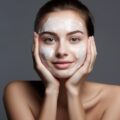The Link Between Hydration and Skin Health
We’ve all heard the advice to drink plenty of water for glowing, healthy skin. But can dehydration really cause wrinkles? Let’s dive into what dermatologists and scientific research have to say about the connection between hydration and skin aging.
While proper hydration is undoubtedly important for overall health and wellbeing, the relationship between water intake and wrinkles is more nuanced than you might think. Understanding the facts can help us take a more balanced, compassionate approach to caring for our skin and bodies.
How Dehydration Affects Your Skin
When your body is dehydrated, it can certainly impact your skin in noticeable ways:
- Dryness and flakiness
- Tightness and less elasticity
- Dullness and lack of glow
- More pronounced fine lines
These effects are usually temporary and will improve once you rehydrate. However, chronic dehydration over time could potentially contribute to premature aging by reducing skin elasticity and volume.
The Truth About Wrinkles and Hydration
While dehydration can temporarily accentuate the appearance of fine lines, dermatologists emphasize that it’s not a direct cause of wrinkles. Dr. Hadley King, a board-certified dermatologist in New York City, explains:
“Drinking water is not going to have a significant impact on your wrinkles. Wrinkles are caused by a loss of collagen and elastin in the skin, which happens as we age and is accelerated by factors like UV exposure and smoking.”
The primary factors that lead to wrinkle formation include:
- Natural aging process
- Sun exposure
- Genetics
- Smoking
- Repeated facial expressions
While hydration isn’t a magic solution for wrinkles, it does play an important role in overall skin health and appearance.
The Benefits of Proper Hydration for Skin
Staying well-hydrated offers numerous benefits for your skin and body:
- Improved skin elasticity and plumpness
- Enhanced circulation and nutrient delivery to skin cells
- Better detoxification and removal of waste products
- Reduced puffiness and inflammation
- Balanced oil production
These benefits contribute to a healthier, more radiant complexion overall. While hydration alone won’t erase wrinkles, it can help your skin look its best at any age.
Holistic Approaches to Skin Health and Aging
Rather than fixating solely on wrinkles or hydration, it’s important to take a holistic approach to skin health and aging gracefully. Some key elements to focus on include:
- Sun protection: Use broad-spectrum sunscreen daily and seek shade when possible.
- Balanced nutrition: Eat a diet rich in antioxidants, healthy fats, and skin-supporting nutrients.
- Stress management: Practice stress-reduction techniques like meditation or yoga.
- Adequate sleep: Aim for 7-9 hours of quality sleep each night.
- Gentle skincare: Use non-irritating products suitable for your skin type.
- Stay hydrated: Drink water throughout the day and eat hydrating foods.
Remember, aging is a natural process, and wrinkles are a normal part of life. Embracing a compassionate attitude towards yourself and your skin can contribute greatly to your overall wellbeing.
The Role of Topical Hydration
While drinking water is important for overall health, topical hydration can have a more direct impact on skin appearance. Dr. Joshua Zeichner, Director of Cosmetic and Clinical Research in Dermatology at Mount Sinai Hospital, notes:
“Topical moisturizers can give an immediate plumping effect to the skin, improving the appearance of fine lines and wrinkles.”
Look for moisturizers containing ingredients like:
- Hyaluronic acid
- Glycerin
- Ceramides
- Niacinamide
These can help attract and retain moisture in the skin, improving its appearance and function. Remember to apply moisturizer to damp skin for best results.
Frequently Asked Questions
1. How much water should I drink for healthy skin?
While individual needs vary, aim for about 8 glasses (64 ounces) of water per day. Listen to your body and drink when you’re thirsty. Remember, you also get water from foods and other beverages.
2. Can drinking more water erase my wrinkles?
No, increased water intake alone won’t erase existing wrinkles. However, proper hydration can improve overall skin health and appearance, potentially making fine lines less noticeable.
3. Are there foods that can help hydrate my skin?
Yes! Water-rich foods like cucumbers, watermelon, strawberries, and lettuce can contribute to your daily fluid intake and skin hydration.
4. How can I tell if my skin is dehydrated?
Dehydrated skin may feel tight, look dull, show more pronounced fine lines, or have a “pinched” appearance when gently squeezed. A dermatologist can help assess your skin’s hydration levels.
5. Is it possible to over-hydrate my skin?
While it’s rare, over-hydrating the skin (usually through excessive use of occlusive moisturizers) can potentially lead to clogged pores or irritation in some people. Listen to your skin and adjust your routine as needed.
In conclusion, while dehydration isn’t a direct cause of wrinkles, proper hydration plays an important role in overall skin health and appearance. By taking a holistic, compassionate approach to skincare and embracing the natural aging process, we can nurture healthy, radiant skin at any age. Remember, true beauty comes from within, reflected in how we care for ourselves and treat others with kindness.









